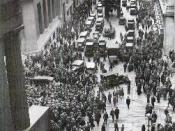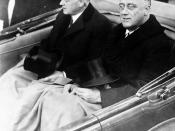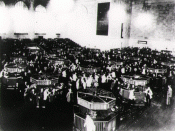Economists still do not agree about what caused the Great Depression, but it appears to be the result of several factors: bank policies, political decisions, historical factors, international concerns, excessive stock speculation, and a decade of prolonged fear for the American people.
It was easy to get credit from banks in the 1920's as the economy was booming.
There were numerous banks and many of them used depositors' funds to purchase stocks in the Stock Market, or speculated in their own stocks. Only approximately a third belonged to the Federal Reserve System. Many individuals were also speculating in the stock market using money they got from loans. They used the stocks they bought for collateral to buy more stock. When the Feds started to raise interest rates and the stock market "crashed" this had a ripple effect on the banks. Not only did some United States banks collapse, but there were foreign banks (our country was not the only country in a depression during the 1930's) that went under also, and many owed the United States banks money.
People who had taken out loans were unable to pay them, banks who had speculated in the stock market lost money, and between 1930 and 1933 the Federal Reserve refused to replenish the banking system sufficiently, so the money supply (total amount of money circulating in the economy) dropped drastically due to bankruptcies from clients who had taken advantage of credit, and then bank failures when a considerable number of customer withdrawals (called a "panic" or a "bank run") caused some banks to close. Even the banks that stayed open were weakened by the unsettled market, the bankruptcies and the other banks failures. All these factors helped the economic output to fall. "Many at the Fed saw the austerity as a bitter...


